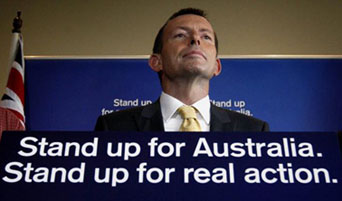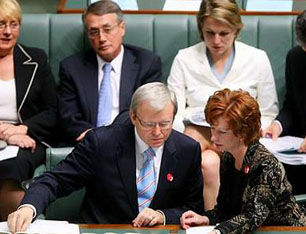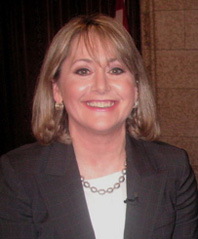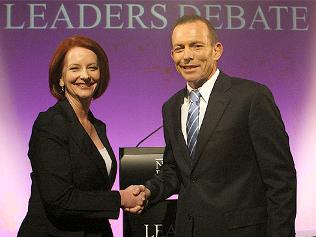No one pretending “coalition” is strange thing in August 21 Australian election
Aug 11th, 2010 | By Randall White | Category: In Brief“We know,” PM Harper told his Conservative summer caucus last week: “there are some in the opposition coalition again threatening an election, but colleagues, that is not what Canadians want.” And just today the sweetheart of Sparks Street Jane Taber is reporting that “Michael Ignatieff is under attack from Stephen Harper’s Conservatives, who are accusing the Liberal leader of once again ‘scheming to impose an unwanted coalition.’”
Meanwhile, this past Monday night, Michael Ignatief himself told a Tory heckler in the Ottawa exurbs that “he has no plans to form a coalition because he already leads a coalition party … ‘We are the coalition, the Liberal Party of Canada is the coalition,’ he said. ‘I’m not running to make coalition with anybody else, I am running to win a Liberal government.’”

Sparks Street mall in Ottawa. Does Jane Taber ever hang out there? Who knows? As they say in the Byward market, maybe, maybe not.
Yet as Ms. Taber’s latest notebook jottings also suggest, “running to win a Liberal government” still looks like a quixotic quest. Moreover, “coalition” is not such a strange term of abuse and unhappiness in Canada’s fellow former self-governing dominion of the now fallen British empire down under. This past Monday Australian Liberal Party leader Tony Abbott was announcing that: “The Coalition is considering taxing all but a fraction of Australians at one simple flat rate, exempting from tax the first $25,000 each Australian earns.”
For any Canadians who may have forgotten, the mainstream of the Australian Liberal Party is quite conservative – and has been an inspiration for Stephen Harper’s new Conservative Party of Canada. And, as explained by no less a source than Wikipedia: “The Coalition in Australian politics refers to a group of centre-right parties that has existed in the form of a coalition agreement since 1922. The Coalition partners are the Liberal Party of Australia (or its predecessors before 1945) and the National Party of Australia (known as the Australian Country Party from 1921-1975 and the National Country Party of Australia from 1975-1982.”

Australian Liberal Party leader Tony Abbott on the campaign trail. Canadians might find the first part of the slogan here vaguely familiar?
There may still be more than a few Canadians as well who have forgotten that there is an Australian federal election this coming Saturday, August 21, 2010.
(August is a strange month for an election in Canada. Apart from the first federal election in 1867, which trundled on for almost six-and-a-half weeks, from Wednesday, August 7 to Friday, September 20, there has been only one Canadian federal election in August – on Monday, August 10, 1953. But, weather-wise, August in Australia is more or less the opposite of what it is in Canada, since the seasons down under are, so to speak, backwards from up here.)
This year’s August 21 federal election in Australia also seems to have its fair share of exotic undertones. To start with, the governing Australian Labour Party (ALP) just recently switched leaders, when it seemed that Mandarin-speaking Kevin Rudd had become too unpopular to win another election. In the process Australia acquired its first female prime minister in Ms. Julia Gillard, who has been described as “a Fabian socialist and member of Emily’s list, a very feminist, pro-abortion group in the Labor Party.”
Ms. Gillard’s accession to the office of Australian prime minister is in its own right interesting food for thought for those Canadian politicians who argue that, under our shared kind of British-born “Westminister parliamentary democracy,” you have to have an election to change prime ministers. Yet, sensitive to complaints that the people of Australia had not really chosen her, Prime Minister Gillard did call the August 21 election, bolstered by the thought that her party was doing not too badly in the opinion polls.

Julia Gillard and the man she finally replaced as prime minister, Kevin Rudd, confer in Australian House of Representatives in an earlier era.
Then the opinion polls suddenly changed, in favour of Tony Abbott and his Liberal-National Coalition. Now the mood in the Land of Oz suddenly seems to have changed again. (See “What a difference 48 hours has made … Has Tony peaked? Suddenly, Prime Minister Julia Gillard’s stocks appear much better.”)
Australia may be even less influential internationally than Canada. But serious political junkies in all parts of the anglosphere will be paying some attention to the results of the thunder down under on August 21. A victory for Mr. Abbott and his Coalition will encourage the conservative right in the US mid-term elections this coming November – and perhaps the Harper Conservatives at some point this fall in Canada too? If Ms. Gillard and the ALP manage to hang on, both President Obama’s party and the so-called terrible left-wing “opposition coalition” up here in the true north will be at least somewhat happier.

Julia Gillard in her kitchen at home, where she is “the first to admit she's not a culinary whiz.” Photo: Ken Irwin.
One good place to follow things from now until a week this coming Saturday is the “Decision 2010” page on the web site of The Age from Melbourne. For more irreverent reportage and commentary, check out the free sections of crikey.
(And on the question of whether we the people of Canada will be having our own opportunity to cast judgment on our current federal political leadership soon enough, according to the Toronto Sun Liberal leader Michael Ignatieff, this past Monday, “said it depends entirely on Prime Minister Stephen Harper whether Canadians head to the polls this fall … ‘It depends on him. It depends on his government. If he acts with wisdom, we can make Parliament work. But if not, I have my duty as leader of the Opposition,’ Ignatieff told reporters.” And, some will say, appointing John Baird as new Conservative house leader does not seem like an act of very great wisdom in this regard?)


